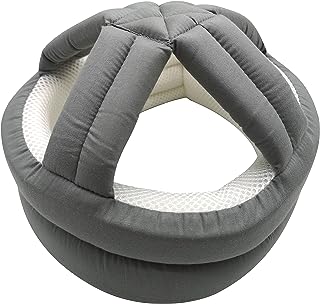When buying a helmet to protect against epilepsy, it’s important to think about certain things to make sure it will keep you safe and work well. Deciding to get a protective helmet is a big deal because it affects how safe and comfortable someone with epilepsy will be. The material, style, comfort, and strength of the helmet are all important in making sure it does its job and gives peace of mind. By looking closely at these important factors, a person can make a smart decision that meets and even goes beyond the needs of people with epilepsy.
See our guide to the best protective helmet for epilepsy.
Material
When choosing a helmet for epilepsy, it’s important to focus on safety and comfort for the person wearing it. A high-quality, durable helmet can provide extra protection and make sure the user stays safe. Lightweight and breathable materials can also make the helmet more comfortable, especially for those who need to wear it for a long time. It’s crucial to find a balance between protection and convenience to make sure the helmet does its job well.
Furthermore, it’s important to pick a material that is easy to clean and maintain to keep the helmet in good condition. A material that resists moisture and odor can help keep the user healthy and make the helmet last longer. By choosing a helmet made from a material that is protective, comfortable, and easy to care for, people with epilepsy can feel more confident and safe in their daily activities, while putting their health first.
Coverage
When you’re looking to buy a helmet for epilepsy, it’s important to think about how well it covers your head. Choosing a helmet that gives you full protection is crucial for preventing injuries from seizures. Look for a helmet that not only covers your head but also has padding around areas like your temples and the back of your head. Having enough coverage is really important for keeping you safe and reducing the chance of head injuries during seizures.
It’s also important to make sure the helmet is right for you based on your specific needs and how your seizures usually happen. Consider things like how often you have seizures, how strong they are, and any movements you might make during them. Getting a helmet with the right amount of coverage shows that you care about staying safe and healthy. Keep in mind that having good coverage with your helmet is key for feeling less worried and more confident in your daily activities when you have epilepsy.
Comfort
When buying a helmet for epilepsy, it’s important to make sure it is comfortable. The person wearing it is already dealing with a lot, so the helmet should not cause more discomfort. Choosing a helmet that is light and well-padded can make a big difference in keeping them safe without making things harder. Comfort should be the main concern when picking a helmet because it can affect how often the person wears it, which in turn affects their safety and peace of mind.
It’s also important to think about things like ventilation and adjustability to make the helmet even more comfortable. Good airflow can stop the person from getting too hot and sweaty, which can be a big problem for people with epilepsy. Making sure the helmet fits well and can be easily adjusted is key to making sure it works properly. By focusing on comfort when choosing a helmet, the person wearing it can have a better experience and feel more secure and protected while going about their day.
Adjustability
When you’re buying a helmet to protect against epilepsy, one important thing to look for is adjustability. Being able to adjust the helmet to fit well makes it more comfortable and effective in preventing head injuries. A well-fitted helmet doesn’t just keep you safe, it also boosts your confidence and makes your overall experience better. It’s essential to have a helmet that can be customized to fit your specific needs, whether you have seizures or other medical conditions. This not only provides extra security but also helps you feel more independent and less self-conscious about wearing protective gear.
Adjustable helmets are a sign of a commitment to safety and quality of life. By letting you customize the fit to your liking, these helmets show a shift towards empowering individuals to manage their health challenges independently. They also adapt to the changing nature of epilepsy and how it affects daily activities. Instead of settling for a one-size-fits-all approach, choosing adjustability shows a proactive effort to promote well-being and self-confidence. Prioritizing adjustability in helmets for epilepsy shows a deep understanding of the diverse needs of people living with epilepsy and a dedication to creating an inclusive and supportive community.
Certification/accreditation
When buying a helmet for epilepsy, it is important to look for certification and accreditation. These show that the helmet meets safety standards and has been tested to ensure quality. Choosing a certified helmet means you can trust that it will do its job effectively.
Accreditation means that the helmet meets specific criteria set by experts. This shows that the helmet is reliable and follows important guidelines. When shopping for protective helmets, it is wise to choose certified and accredited options for safety and quality.
In a situation where protection is crucial, choosing certified and accredited helmets is a smart way to stay safe and have peace of mind for people with epilepsy.
Conclusion
In a world where safety and innovation come together, the protective helmet for epilepsy is bringing hope to people dealing with seizure disorders. This special helmet offers both protection and confidence, keeping individuals safe while also giving them the strength to face each day with resilience and dignity. Through the use of technology and compassion, this helmet represents progress and inclusivity, leading us towards a future where everyone can live their life fully and without limits.
